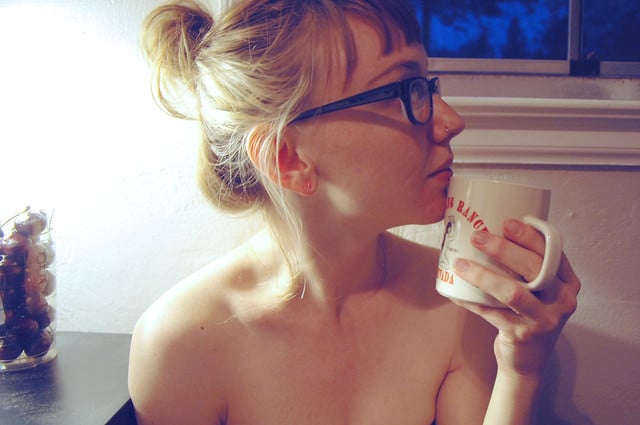Part 1 of a 3 part series inspired by Pema Chodron and her book, When Things Fall Apart: Heart Advice for Difficult Times
Part 1: The Fall Apart Heart
“Funny how a heart shatters all at once, seems like it should make a sound.” ~ The Weepies.
The broken heart is an eternally human story; it’s a rare bird who makes it through life unscathed. Even though I am, admittedly, somewhat of a relationship oddball, this story is about an unremarkable heartbreak: just an ordinary broken heart that also happened to change my life.
I’ve had no shortage of test flights. Over the years, I’ve created every kind of relationship entertainment; uncommon fondness, major infatuation, distracting lust, or try-to-force-the-too-big-foot-into-the-too-small-shoe kind of relationships; one after another – a seemingly endless cycle of optimistic trial, and all-too-familiar error, all the while wondering if this is what the fuss is all about.
I’ve noticed my pinched laugh when bumping into my ‘relationship carnage’ in my smallish town, the bizarro-world quality of teaching the children of ex-boyfriends, and I’ve even briefly entertained the idea of recycling an old, failed relationship – the only kind of recycling that is a very bad idea.
When relationships ended, my breakup behavior was clichéd: moody, coffee shop journaling, a new haircut, a self-help book, the comfort of friends, or miles of running while muttering to myself. Nothing new here – just me (and a gazillion other humans) attempting to lessen the pain and suffering triggered by expectations, humiliation, regret, blame, and anger in the aftermath of a relationship crash.
This relationship was different.
It started out like the fairy tale I thought had passed me by. On our first date at a chic California inn, he toasted me by candlelight; “I’m grateful to have met you,” he said.
“I really see you,” he said, in his velvety, bass-toned voice. I have always been a sucker for velvety, bass-toned voices.
“Let’s make plans,” he said.
I watched him play sweetly with his tow-headed little girl, and witnessed his tearful devotion to his late father. We shared books, played music together, and laughed. I was inspired by him; the only man I knew (at the time) with a spiritual practice.
I fell in love, swiftly and completely.
One fall evening, my phone jangled at the usual time. He was calling from his mountaintop three states away. I sprinted up my stairs, nearly stepping on the cat, naively clinging to my questionable belief that if the phone rings, he cares.
”I don’t love you,” he said.
I lost my breath, my ears buzzed. I collapsed into a fog of pain that I had never known before.
Since that day, I have come to describe the experience as being knocked over the head with something like a rubber mallet. Everything stopped. For a while, working, eating, sleeping were nearly impossible. All I could do was sit and cry. In between sitting and crying, I read, When Things Fall Apart.
Nowhere to Hide: Learning to Stay
Those four little words stopped me in my tracks. I had reached my limit. No matter how I tried, I couldn’t find a way to run from this pain. Instead, it became my first, real teacher.
Since there was nowhere to go, I stayed. I sat myself down, and started breathing. My beginner’s meditation technique was awkward, but it didn’t matter. I knew I was being ‘nailed to the spot’ and that sitting and breathing was the only place I could be.
“How do we work with our minds when we meet our match…rather than indulge or reject our experience, we can somehow let the energy of the emotion, the quality of what we’re feeling, pierce us to the heart.”
Before long, I was able to separate my painful feelings from the stories I invented to go with them. When pain is untangled from its story, the experience is cleaner, fresher – like a passing wave. The waves came and went, came and went, but my experience of them grew lighter, less dramatic, and more easily let go.
I was also somewhat surprised (and unusually comforted) to discover that I was not alone.
“It starts with realizing that whatever occurs is neither the beginning, nor the end. It is just the same kind of normal, human experience that’s been happening to people since the beginning of time. “
As the months passed, and I dove more deeply into the practice of Shamatha Meditation, I discovered that my theatrical, story-filled mind could be trained. My painful thoughts could be released, gently and compassionately, and that I could wake-up, bravely, to the truth of myself.
Scaredy-Cat: Developing Courage
“The most difficult times are the ones we give ourselves.”
I’ve always been squeamish. Killing bugs, scary movies, and facing painful truths have never been my cup of tea. For many years, I was only open to feedback with a strict set of criteria – unless it was delivered gently and kindly, I rejected it out of hand. “You’re so sensitive,” was a recurring tidbit from the people close to me.
Being knocked over the head with heartbreak woke me up to who I am and what I do. A willingness to look at my patterns, habits and shortcomings was only possible after I learned to bring kindness to the table.
In all kinds of situations, we can find out what is true simply by studying ourselves in every nook and cranny, in every black hole and bright spot, whether it’s murky, creepy, grisly, splendid, spooky, frightening, joyful, inspiring, peaceful or wrathful. We can just look at the whole thing. There’s a lot of encouragement to do this, and meditation gives us the method.
With compassion, I have discovered the courage necessary for self-examination. Using the practice of maitri, or unconditional friendliness, I have been able to look my demons squarely in the eye. On the bright side, compassion has also removed the thick veil that masked my recognition of my more attractive qualities – an added bonus.
“When we’ve seen ourselves completely, there is a stillness of body that is like a mountain.”
Denied: Addicted to Hope
“When everything falls apart and we feel uncertainty, shock, disappointment, embarrassment, what’s left is a mind that’s clear, unbiased, and fresh.”
I didn’t get what I wanted. Not an easy fact for me to accept. Until recently, I have believed that if I work hard, am a good person, and follow my passion, I will be rewarded…with what I want. I have always wanted an extraordinary relationship.
“In Tibetan, there’s an interesting word: ye tang che…Altogether, ye tang che means totally tired out. We might say ‘totally fed up.’ It describes an experience of complete hopelessness, of completely giving up hope. This is an important point. This is the beginning of the beginning. Without giving up hope – that there’s somewhere better to be – we will never relax with where we are, or who we are. “
Finally, I have dropped it – given up hope. I’ve stopped the hamster wheel of grasping outside myself for whatever. The relief is palpable. I was ye tang che from all the primping, planning, and posturing I found myself engaged in toward attracting the right mate, business, family, life.
Since hope comes from a feeling that we lack something, from a sense of poverty, hope also keeps us from relaxing with ourselves. “We hold onto hope, and hope robs us of the present moment.”
I’ve given up hope, and I am sticking with myself.
Thanks for the heartbreak, baby.
Note: All quotations in the body of this article come from Pema Chodron’s book When Things Fall Apart: Heart Advice for Difficult Times.
 Share on bsky
Share on bsky


Read 32 comments and reply